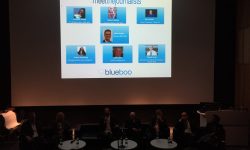Vitis: How did you first get into journalism?
CH: I joined the Morgan Grampian (Woolwich, south-east London) graduate training scheme in 1988. It meant that I learned on the job, although then the job still involved a typewriter, typesetters, galleys and proofing on sheets of paper! I learned a lot – not just about journalism and magazine production, but about how the sales team and editorial team can work together and how it really is all about your contact book!
Vitis: Things have certainly changed! Do you see a future for print?
CH: At the moment, there is still a need for print publications. Magazines are still being introduced and appearing on the shelves. In B2B there is still a lot of print, especially with feature articles but the internet and magazine home pages are great for news.
The digital revolution has made journalism immediate and accessible; journalists can file stories anywhere and at any time, now. Similarly, readers can access news and features at any time and wherever they are.
Vitis: What do these changes mean for journalists/publishing today?
CH: There is a lot of pressure to file stories wherever you are, which can be exhilarating and liberating, but it can also be restrictive. At an exhibition recently I found that I was not able to explore and discover new companies as I had to structure my time to interview companies and get the news online immediately.
If an email or internet connection is dropped there is a feeling of panic, but work can go on, and there is always the telephone. I freelance now and have noticed that offices are much quieter – even open plan ones. The phone rarely rings – everyone emails! The irony is sometimes the conversation would take 60 seconds while emails go back and forth, clarifying points for days!
There is still nothing like human interaction and contact, but this takes investment in staff. It takes time and skill to create a well-researched article or news piece, and without a good editorial team, these will not be written or will be trite and lightweight, adding no value for the reader.
Vitis: What advice would you give someone thinking of entering journalism?
CH: I do attend school career fairs to introduce the idea of B2B journalism to students, so they don’t think it is just The Times or The Sun. I tell them to find something they enjoy writing about, talking about, finding out about and go for it. It doesn’t seem like work if you can do that.
Vitis: The role of PR has changed too - what do PR companies have to do to make you listen to them?
CH: Contacts, contacts, contacts! It is always easier to talk to someone to pitch an idea if you have met. Somehow, the conversation (or email exchange) progresses further and quicker, when the two parties know each other.
There are also more ways to get stories out there. Twitter, Facebook etc. They can be good leads for journalists, but it is important to make sure the message is not drowned out with other social media ‘noise’.
There are also videos, YouTube is now omnipresent so marketeers have to work harder to get people to notice ‘another promotional video’
Vitis: What are the best - and worse - parts of the job?
It’s the same answer for both – travel. I have been to some great places, stayed in some great hotels and met some great people; but the airlines are piling more people into smaller spaces and herding them through airports, which makes travel a chore and not a pleasure any more.
I have just come back from Embedded World in Nuremberg and flew from London City airport – it’s like travel used to be 30 years ago, quieter, calmer, and less crowded but with modern freight!
Vitis: Who was the most interesting person you have interviewed?
CH: I was lucky to interview Eric Lidow who founded International Rectifier. He was 99 years old and a bit flirtatious! He had some wonderful stories about post-war California and the pioneering spirit in creating the company. He was very entertaining about modern life, still full of ideas for nuclear power and electric vehicles. I hope I have half that enthusiasm for life and work in a few years’ time!
Vitis: What advice would you give your younger self?
CH: Relax – it will all be ok. Enjoy yourself and remember you can’t regret what you didn’t do.
Caroline Hayes can be contacted at caroline.hayes@ruivamedia.com. Follow her on Twitter: CazzaHayesRedEd








